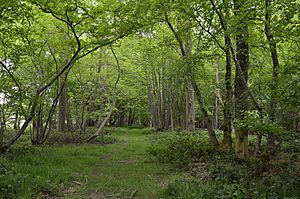Bovingdon Hall Woods facts for kids
| Site of Special Scientific Interest | |

Parkhall Wood
|
|
| Area of Search | Essex |
|---|---|
| Grid reference | |
| Interest | Biological |
| Area | 69.4 hectares |
| Notification | 1986 |
| Location map | Magic Map |
Bovingdon Hall Woods is a very special natural area located north of Braintree in Essex. It covers about 69.4 hectares, which is like 170 football fields! This site is made up of several different woodlands, including Parkhall Wood, Bovingdon Wood, Shoulder of Mutton Wood, and Maid's Wood.
It's officially known as a Site of Special Scientific Interest, or SSSI. This means it's a place that scientists have identified as being very important for its plants, animals, or geology.
Contents
What Makes Bovingdon Hall Woods Special?
Bovingdon Hall Woods is a "biological" SSSI. This means it's important because of its living things, especially its unique trees and plants.
Ancient Woodlands
The woods here are very old. They are "coppice woodland of medieval origin." This means people have been managing these woods for hundreds of years, since the Middle Ages. They would cut trees down to the stump, and new shoots would grow back. This method helps keep the woodland healthy.
The soil is made of chalky boulder clay. This type of soil helps certain plants and trees to grow well.
Unique Trees and Plants
Bovingdon Hall Woods has some unusual types of trees. You can find:
- Small-leaved lime (Tilia cordata): This tree is not very common in many places.
- Plateau alder: Another special tree that grows well in this area.
Other common trees you might see include:
- Sessile and pedunculate oak
- Ash
- Maple
- Hornbeam
- Occasional wild service tree
Understory Plants
Below the main trees, there's a layer of smaller plants and shrubs called the "understory." Here, you'll find:
- Elder
- Hazel
- Field maple
- Hawthorn
The ground is mostly covered by bramble, which is a thorny bush.
Ponds and Dells
The woods also have many natural ponds. These small bodies of water are important habitats for insects, amphibians, and other wildlife. You might also find "dells," which are small, natural hollows or valleys in the land.
Visiting Bovingdon Hall Woods
It's important to know that Bovingdon Hall Woods is private land. This means there is no public access for people to visit. It's protected to keep its special natural features safe.

